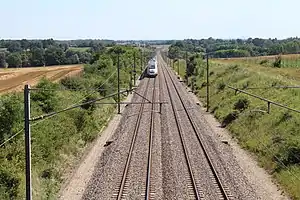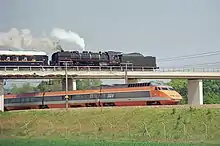LGV Sud-Est
The LGV Sud-Est (French: Ligne à Grande Vitesse Sud-Est; English: Southeast high-speed line) is a French high-speed rail line which connects the Paris and Lyon areas. It was France's first high-speed rail line. The inauguration of the first section between Saint-Florentin and Sathonay-Camp by President François Mitterrand on 22 September 1981 marked the beginning of the re-invigoration of French passenger rail service.
| LGV Sud-Est | ||||||||||||||||||||||||||||||||||||||||||||||||||||||||||||||||||||||||||||||||||||||||||||||||||||||||||||||||||||||||||||||||||||||||||||||||||||||||||||||||||||||||||
|---|---|---|---|---|---|---|---|---|---|---|---|---|---|---|---|---|---|---|---|---|---|---|---|---|---|---|---|---|---|---|---|---|---|---|---|---|---|---|---|---|---|---|---|---|---|---|---|---|---|---|---|---|---|---|---|---|---|---|---|---|---|---|---|---|---|---|---|---|---|---|---|---|---|---|---|---|---|---|---|---|---|---|---|---|---|---|---|---|---|---|---|---|---|---|---|---|---|---|---|---|---|---|---|---|---|---|---|---|---|---|---|---|---|---|---|---|---|---|---|---|---|---|---|---|---|---|---|---|---|---|---|---|---|---|---|---|---|---|---|---|---|---|---|---|---|---|---|---|---|---|---|---|---|---|---|---|---|---|---|---|---|---|---|---|---|---|---|---|---|---|
 The LGV Sud-Est in Cruzilles-lès-Mépillat | ||||||||||||||||||||||||||||||||||||||||||||||||||||||||||||||||||||||||||||||||||||||||||||||||||||||||||||||||||||||||||||||||||||||||||||||||||||||||||||||||||||||||||
| Overview | ||||||||||||||||||||||||||||||||||||||||||||||||||||||||||||||||||||||||||||||||||||||||||||||||||||||||||||||||||||||||||||||||||||||||||||||||||||||||||||||||||||||||||
| Status | Operational | |||||||||||||||||||||||||||||||||||||||||||||||||||||||||||||||||||||||||||||||||||||||||||||||||||||||||||||||||||||||||||||||||||||||||||||||||||||||||||||||||||||||||
| Owner | SNCF (1981–1997) RFF (1997–2014) SNCF Réseau (2015–present) | |||||||||||||||||||||||||||||||||||||||||||||||||||||||||||||||||||||||||||||||||||||||||||||||||||||||||||||||||||||||||||||||||||||||||||||||||||||||||||||||||||||||||
| Locale | Île-de-France, Bourgogne-Franche-Comté, Auvergne-Rhône-Alpes, | |||||||||||||||||||||||||||||||||||||||||||||||||||||||||||||||||||||||||||||||||||||||||||||||||||||||||||||||||||||||||||||||||||||||||||||||||||||||||||||||||||||||||
| Termini | Combs-la-Ville, Seine-et-Marne Sathonay-Camp, Lyon Metropolis | |||||||||||||||||||||||||||||||||||||||||||||||||||||||||||||||||||||||||||||||||||||||||||||||||||||||||||||||||||||||||||||||||||||||||||||||||||||||||||||||||||||||||
| Service | ||||||||||||||||||||||||||||||||||||||||||||||||||||||||||||||||||||||||||||||||||||||||||||||||||||||||||||||||||||||||||||||||||||||||||||||||||||||||||||||||||||||||||
| System | SNCF | |||||||||||||||||||||||||||||||||||||||||||||||||||||||||||||||||||||||||||||||||||||||||||||||||||||||||||||||||||||||||||||||||||||||||||||||||||||||||||||||||||||||||
| Operator(s) | SNCF | |||||||||||||||||||||||||||||||||||||||||||||||||||||||||||||||||||||||||||||||||||||||||||||||||||||||||||||||||||||||||||||||||||||||||||||||||||||||||||||||||||||||||
| History | ||||||||||||||||||||||||||||||||||||||||||||||||||||||||||||||||||||||||||||||||||||||||||||||||||||||||||||||||||||||||||||||||||||||||||||||||||||||||||||||||||||||||||
| Opened | 22 September 1981: Saint-Florentin–Sathonay-Camp 25 September 1983: Combs-la-Ville–Saint-Florentin | |||||||||||||||||||||||||||||||||||||||||||||||||||||||||||||||||||||||||||||||||||||||||||||||||||||||||||||||||||||||||||||||||||||||||||||||||||||||||||||||||||||||||
| Technical | ||||||||||||||||||||||||||||||||||||||||||||||||||||||||||||||||||||||||||||||||||||||||||||||||||||||||||||||||||||||||||||||||||||||||||||||||||||||||||||||||||||||||||
| Line length | 409 km (254 mi) | |||||||||||||||||||||||||||||||||||||||||||||||||||||||||||||||||||||||||||||||||||||||||||||||||||||||||||||||||||||||||||||||||||||||||||||||||||||||||||||||||||||||||
| Number of tracks | Double track | |||||||||||||||||||||||||||||||||||||||||||||||||||||||||||||||||||||||||||||||||||||||||||||||||||||||||||||||||||||||||||||||||||||||||||||||||||||||||||||||||||||||||
| Track gauge | 1,435 mm (4 ft 8 1⁄2 in) standard gauge | |||||||||||||||||||||||||||||||||||||||||||||||||||||||||||||||||||||||||||||||||||||||||||||||||||||||||||||||||||||||||||||||||||||||||||||||||||||||||||||||||||||||||
| Electrification | 25 kV 50 Hz[1] | |||||||||||||||||||||||||||||||||||||||||||||||||||||||||||||||||||||||||||||||||||||||||||||||||||||||||||||||||||||||||||||||||||||||||||||||||||||||||||||||||||||||||
| Operating speed | 300 km/h (186 mph) | |||||||||||||||||||||||||||||||||||||||||||||||||||||||||||||||||||||||||||||||||||||||||||||||||||||||||||||||||||||||||||||||||||||||||||||||||||||||||||||||||||||||||
| Signalling | TVM-300 | |||||||||||||||||||||||||||||||||||||||||||||||||||||||||||||||||||||||||||||||||||||||||||||||||||||||||||||||||||||||||||||||||||||||||||||||||||||||||||||||||||||||||
| ||||||||||||||||||||||||||||||||||||||||||||||||||||||||||||||||||||||||||||||||||||||||||||||||||||||||||||||||||||||||||||||||||||||||||||||||||||||||||||||||||||||||||
Other LGV projects have extended the reach of high-speed trains that use this line, including the LGV Rhône-Alpes and LGV Méditerranée to the south and the LGV Interconnexion Est to the north. These connecting lines has led to the speeding up of journey time between Paris and the southeast quarter of France (Marseille, Montpellier and Nice), Switzerland and Italy, as well as between the southeast and the north and west of France, the United Kingdom and Belgium. The LGV Rhône-Alpes, Sud-Est and Méditerranée when completed, also received their nickname, the City To Coast (C2C) Highway.
Route
The line crosses six departments, from north to south:
The TGV system's compatibility with the regular rail network avoided the need for new infrastructure construction to reach existing train stations in the dense urban areas of Paris and Lyon.
The distance from Paris (Gare de Lyon) to Lyon (Part-Dieu) is 425 km (264 mi). The LGV route is 409 km (254 mi) long; by avoiding built-up areas between Paris and Lyon (particularly Dijon) this enables a route 87 km (54 mi) shorter than the regular line—512 km (318 mi). There are no tunnels.
The line includes various connectors to the regular rail network:
- at Pasilly-Aisy towards Dijon, and further through the Jura Mountains to Vallorbe and Lausanne or Neuchâtel and Zurich
- at Mâcon-Pont-de-Veyle towards Bourg-en-Bresse and the Savoie department
- at Saint-Florentin
- at Le Creusot station
- at Mâcon-Loché station
These last three are used by service trains or in order to divert passenger trains if needed.
The line runs next to the A5 autoroute for 60 km (37 mi) and the N79 road for 15 km (9.3 mi). For its full length, a 5 m (16 ft) wide area has been reserved for a telecommunication artery.
Line specifics

The line has a surface area of 16 km2 (6.2 sq mi)—in comparison Charles de Gaulle Airport occupies 32 km2 (12 sq mi)—with an average width of 40 m (130 ft). Platforms are 13 m (43 ft) wide, with a space between track centres of 4.2 m (14 ft). The line was designed for a nominal speed of 300 km/h (190 mph), with a minimum radius curve of 4,000 m (13,100 ft)—although seven curves were made to a smaller radius, but no less than 3,200 m or 10,500 ft.
In total, the line comprises 847 km (526 mi) of track. This is formed by UIC 60 (60.3 kg/m [40.5 lb/ft]) rails placed in lengths of 288 m (945 ft), welded in place (with certain segmented sections). The concrete sleepers of 2.41 m (7 ft 11 in) are formed of two blocks of concrete tied together by a metal strut. There are 1660 sleepers per kilometer.
Traction power is supplied by eight EDF substations at 25 kV AC, 50 Hz. The catenary is fed by a "feeder" cable in phase opposition, which is equivalent to a 50 kV supply and reinforces the available power, one trainset being able to draw up to 14 MW.
Signalling draws on high-frequency track circuits, signals being transmitted directly to the driver's console. There are lineside marker boards indicating the limits of each block section, but no signals as such.
The highest point on the line is 489 m (1,604 ft) above sea level, near the town of Liernais, 55.5 km (34.5 mi) north of Gare du Creusot. This is near the range dividing the Seine and Loire river valleys, and not far from the Rhone river valley.
Stations
The LGV Sud-Est serves the following stations:
Le-Creusot and Mâcon-Loché are threadbare stations situated away from built-up areas. They have two side platforms and four tracks, with the two central tracks being reserved for through trains, and the side tracks serving stopping trains.
Costs
| Item | Cost, nominal[2] (in 1984 francs) | Cost, real (in 2007 euros) |
|---|---|---|
| Construction of superstructure and infrastructure | 7.85 billion | 2.0 billion |
| Construction of superstructure and infrastructure, with land purchase | 8.5 billion | 2.15 billion |
| Rolling stock | 5.3 billion | 1.35 billion |
| Total | 13.8 billion | 3.5 billion |
From 1996, the LGV Sud-Est received track renewal at a cost of FRF 2 billion,[2] or about €300 million.
History
- 10 July 1967: SNCF research management launches project C 03 on high speed, titled "Rail Transport Possibilities through New Infrastructure"
- 26 March 1971: approval of new line project by inter-ministerial committee
- 23 March 1976: declaration of public utility, the decree being signed by Prime Minister Jacques Chirac
- 7 December 1976: works commence at Écuisses, Saône-et-Loire
- 14 June 1979: first rails laid near Montchanin, Saône-et-Loire
- 20 November 1980: track laying ends in Cluny, Saône-et-Loire
- 26 February 1981: trainset no. 16 (SNCF TGV Sud-Est) breaks the world record for rail speed at 380 km/h between Courcelles-Frémoy, Côte-d'Or and Dyé, Yonne in a gradually descending portion of the line
- 22 September 1981: inauguration of first section (Saint-Florentin to Montchanin) by President of the Republic, François Mitterrand
- 27 September 1981: commercial service begins
- 25 September 1983: service begins on northern section (Combs-la-Ville to Saint-Florentin)[3]
- 31 August 1992: derailment at 270 km/h of a TGV in Macon-Loché station; several waiting passengers on the platform are slightly injured by flying ballast
- 13 December 1992: service begins on northern section of LGV Rhône-Alpes (Montanay to Saint-Quentin-Fallavier)
- 26 May 1994: service begins on LGV Interconnexion Est (connection with LGV Nord)
- March 1996: beginning of line renovation works (replacement of ballast and points, works designed to last until 2006)
- 2 June 1996: service begins at the junction with Villeneuve-Saint-Georges by the Coubert triangle
See also
References
- "RFF - Map of electrified railway lines" (PDF).
- Quid.fr, Autres TGV Archived 2007-12-12 at the Wayback Machine
- Perren, Brian (October 1983). "TGV: the completion of a dream". Rail Enthusiast. EMAP National Publications. pp. 35–40. ISSN 0262-561X. OCLC 49957965.